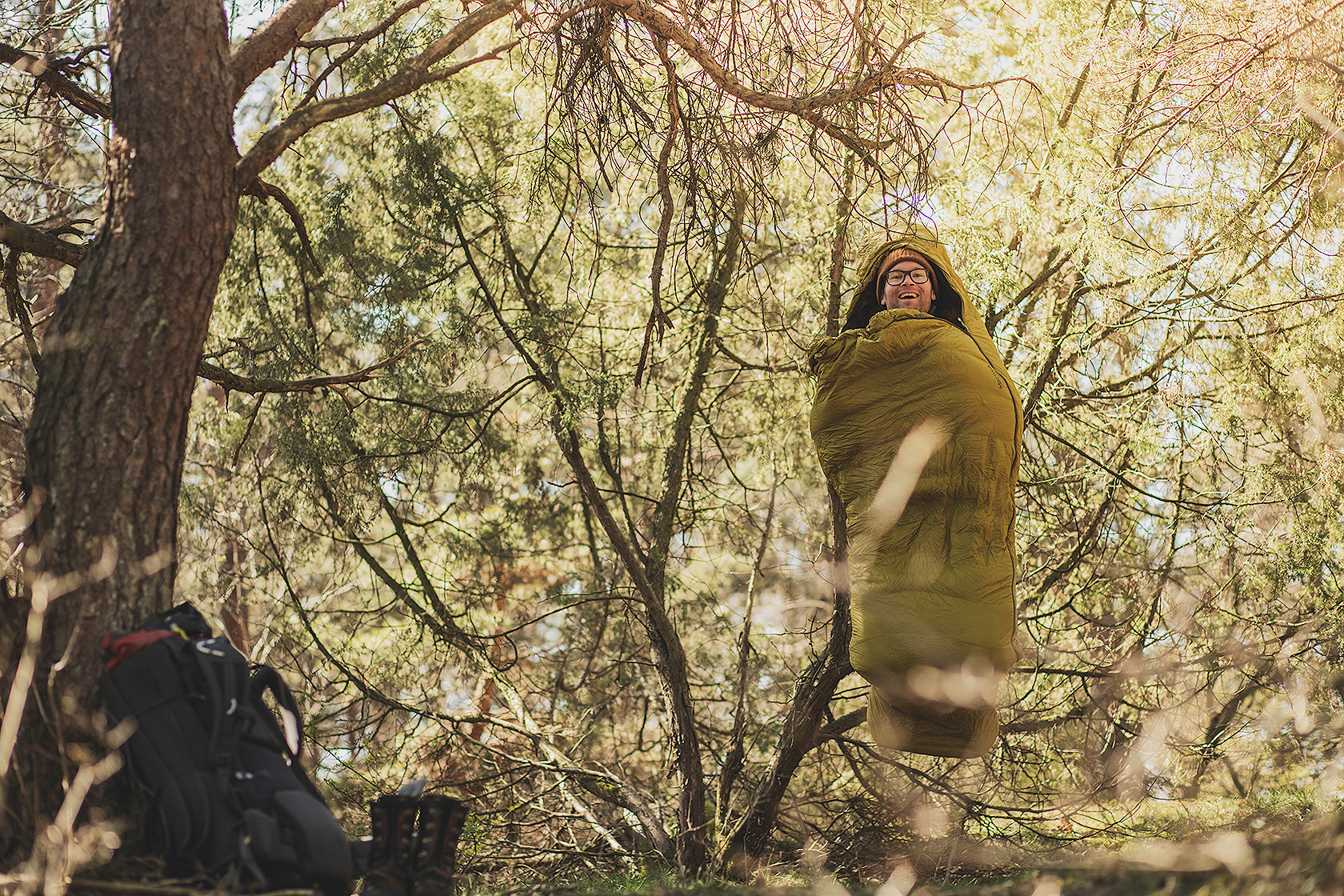Sleep well outdoors
Useful tips that could help you sleep well outside.
Being cold
Don’t go to bed cold. Do something before! A couple of jumping jacks or a short run around the camp. While you’re at it, wave your arms and smile. The sleeping bag does not create heat, it only keeps the heat you create. If you’re cold it will take much longer to get warm.
Nalgene bottle
A great tip for really cold nights is to boil water and fill a Nalgene bottle, wrap it in a t-shirt or put a sock over it and take it to bed with you. Try putting it at your feet or holding it close to your core, maybe one at each location if you have two Nalgene bottles.
Downtime
Do yourself a favor and plan for some downtime at camp so you have the possibility to wind down and cool off before going to bed. I usually write down some notes about the day, processing it all.
Eat something
Eat something before going to bed (energy to warm your body). If you go to bed properly fed you have a better chance at a restful sleep. An energy bar midway through the night is like putting another log on the fire.
Answer the call
Pee before bed. A large volume of pee can make you cold and probably you will have to go out in the middle of the night. Avoid drinking too much fluids within two hours of sleeping, if possible. A pee bottle keeps you in sleep mode. If you get up to relieve yourself perhaps you will have trouble going back to sleep? What works for you?
Clothes
For a good night’s sleep and long-lasting gear use base layers, socks and a hat (your head remains more exposed than the rest of your body). It will help you stay warm and not negatively influence your sleeping bag fill and mattress. Long johns also prevent your thighs from gluing together after a long day’s hike. Think clean fresh clothes. Don’t sleep in the clothes you’ve had on all day!
Having things in the bag
During summer I prefer not to dry my damp clothes in the sleeping bag. In the sleeping bag you want to rest and gather energy for the next day. During winter adventures I think a little different. I then put my InReach, power bank, damp socks, warm Nalgene bottle and other stuff there. I wake up a couple of times during the night and have to move things around. The win is that batteries work better and that everything is dry or at least less damp in the morning. With that said. Always try to be as dry as possible and this also applies to your sleeping bag.
Helpful collar
If it’s cold outside a sleeping bag with a collar will help you a lot. It will stop the warm air from getting out and cold air getting in. Every time you move, the air moves. If you have a fleece jacket or something but no collar you can put your fleece at chest height stopping cold air getting in and warm air getting out while sleeping.
Too large/small sleeping bag
If your sleeping bag is too large you will easily get cold because you still have to heat up all the space you don’t really use. If you already have one or borrowed from a friend try to put a strap around it and close off the area you don’t use. If your sleeping bag is too narrow you will put pressure on the sides of your sleeping bag and therefore the insulation will be more compact in that area. This will make you cold because the air in the insulation is minimized. And remember that sleeping bags are designed to be zipped.
Wind
Get away from the wind. If you sleep under the stars without a tent or shelter the wind can “eat” its way into the bag and you will get cold with time. If you have a bigger backpack you can use it as a wind blocker. I once slept with a dry bag 40L over my lower body and pointing towards the wind – it’s a good wind blocker. Perhaps also look for a bivy bag if you regularly sleep under the stars.
Mattress
Insulate from the ground up! You end up losing way more heat through conduction than convection. In very cold weather I will use two (one inflatable and one closed-cell mattress). Look at R-Values. Don’t over-inflate your sleeping pad. Most people tend to sleep better on a slightly under-filled mattress. Think about that your mattress can gain or lose pressure during the night as well. Cold nights your mattress may lose air pressure as cold air compresses, while on warm nights the pressure could increase as warm air expands.
Earplugs
Snoring tent partner or windy nights?
Sleep flat
Look for a place without large rocks and other objects that could affect your sleep. Don’t be afraid to lay on the ground for some time before deciding to ensure that it is comfortable.
Pillow or no pillow?
Bring a pillow! It is too often overlooked. Don’t “rough it”. People may call you a wimp, but hey you probably slept the best!
When you arrive unpack your sleeping bag right away. Whether it’s down or synthetic, sleeping bag insulation needs loft to keep you warm. Put your sleeping clothes, socks, and your pillow inside your sleeping bag before dinner. This keeps away any chill or moisture and feels so much nicer next to your skin at bedtime.
And remember that no two sleepers are alike!


